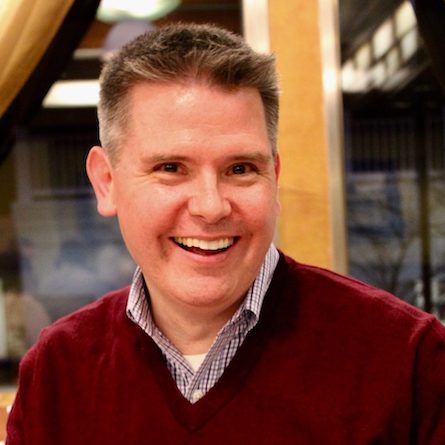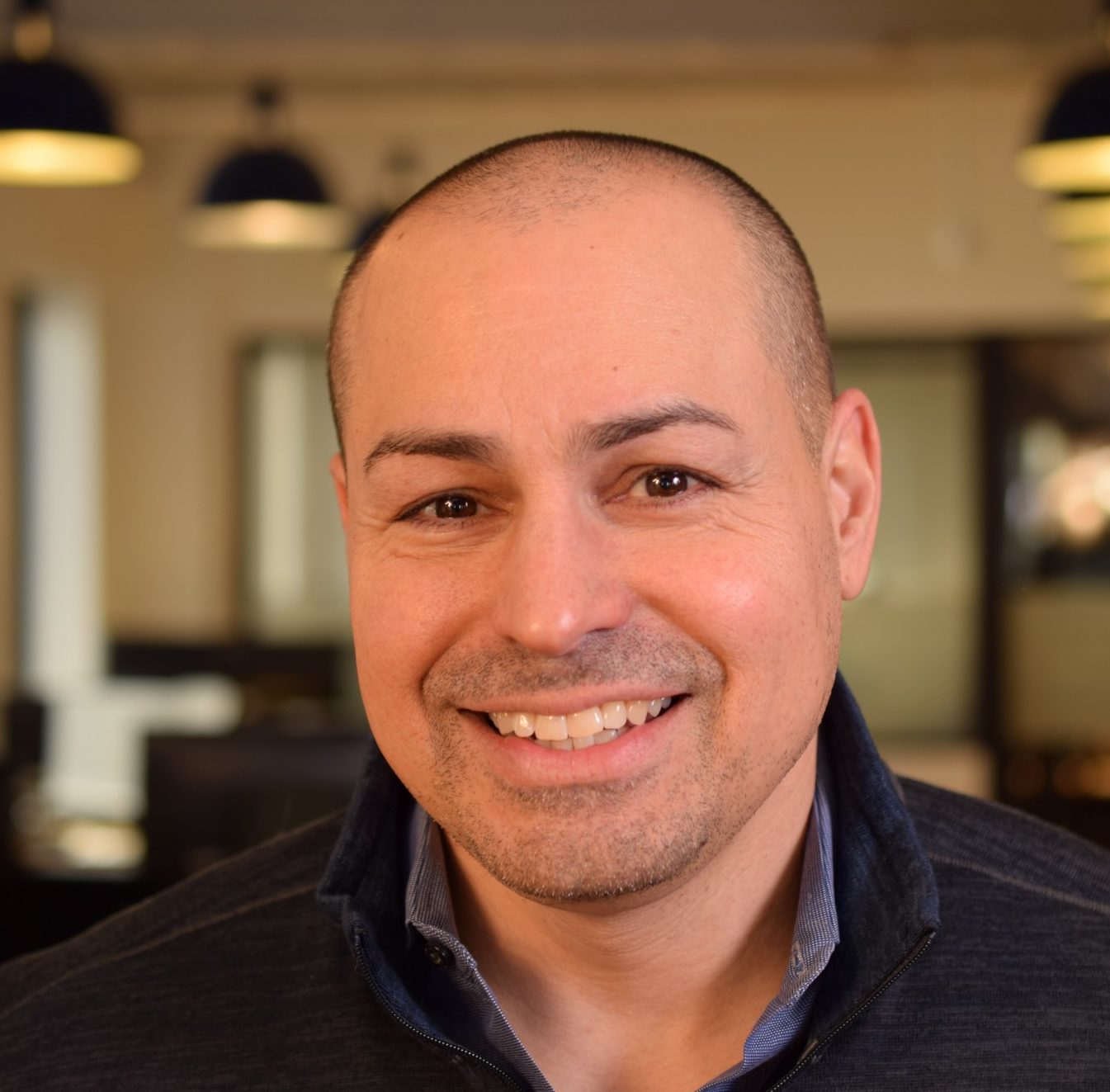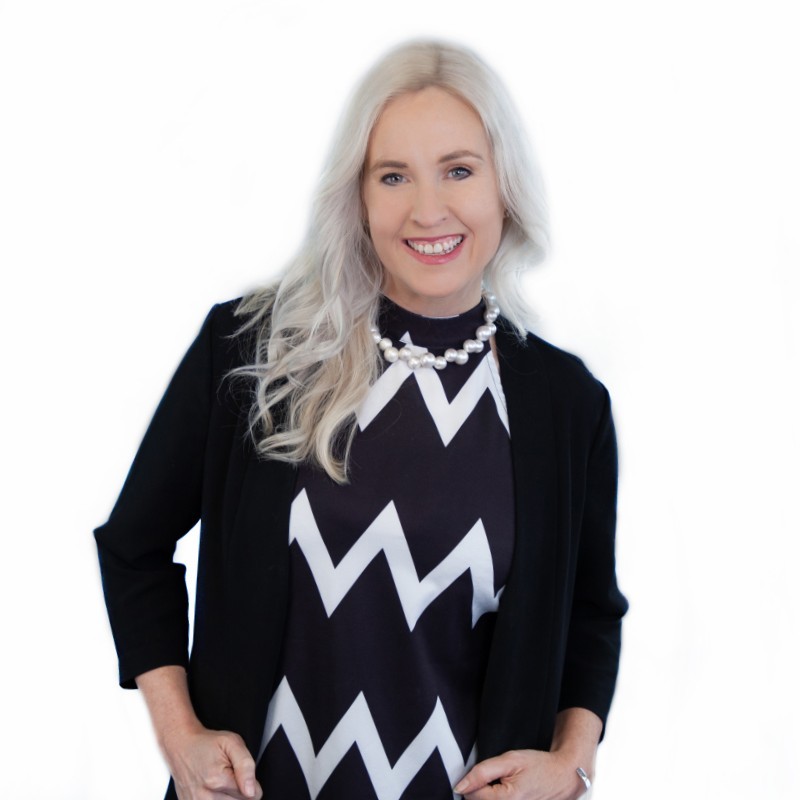What are we talking about?
Leading humans, specifically why vulnerability is important when leading teams in the future.
Why is vulnerable leadership important to the future of work?
As we move to the future, most of human work is going to be centered on stuff we don’t know. If we know it, we can give it to machines and they can figure out how to do it faster, better, cheaper, etc. But humans will be involved in figuring out new problems where we don’t have the answers.
But the model of leadership we have not says that leaders must know all the answers. They are often afraid of revealing their true vulnerable self. Leaders of people in the future should be comfortable admitting that they don’t know everything, and then build solid rapport and trust with their teams to get to where they need to go
John Neral is a leadership coach who helps people show up as their whole selves and lead others from a vulnerable and humble mindset.
What John Neral taught us about vulnerable leadership
As people get promoted to lead teams, they often feel like they need to have it all together and shouldn’t expose their weaknesses. However, by showing their vulnerability, they actually can actually build more trust with the people they work with.
When a leader says, “I’m not sure how to answer that, but I know we can figure this out together”, that’s a powerful moment for any team.
John uses the acronym SHOW UP to help people understand how to bring their best, vulnerable self to work. There are six tips in there, and we dived into a few of them.
One is setting ground rules, and making sure that everyone knows how you are going to conduct the team, or a code of conduct.
Another is demonstrating your genius. People should know what to come to you for, and you should know where others are best.
Learn more about John Neral
https://www.johnneral.com/
https://www.linkedin.com/in/johnneral/
Today, our guest is John Neral. He’s a leadership and career coach and this episode is Work Minus Fear. Hi, John. How are you today?
I’m great, Neil. How are you?
I’m doing very well. This topic that we’re going to be talking about is very important to me personally because as we navigate the future of work, we always try to keep humanity in our focus, trying to say we are humans, we are trying to figure out the best way to work as humans in the future as we interact more with technology. But this is also something that’s important to you, too. So, I want you to introduce the idea of why relationships and authentic relationships are important in the workplace.
So, thank you so much. One of the things that I have valued so much throughout my entire career has been the relationships that I’ve been able to form. And one of the things that has meant so much is that when we get to show up authentically as ourselves, we get to build those relationships that are grounded in some key foundations. I don’t believe that we formed these relationships without creating trust. And without trust, we have nothing. Our colleagues don’t believe in us. Our organizations lose faith in us. And our business relationships with our clients and our customers falter because they just don’t know how to trust us. One of the sports psychologists, Dr. Dean Hinitz, has this great phrase which is trust is repeated behavior over time. And he says that in the scope of athletics, when it comes time for you to make a shot, you have to rely on your training that you have spent thousands and thousands and hours of hours doing so that in that moment, you’re able to rely on that, and you’re able to make that best possible shot. And I take that and when we move that into the workplace and we think about trust, we have to invest those hours over and over and over again when we’re looking at our organizational culture and the relationships that we have. And if we’re not taking time to build that trust, there’s no way we can have an authentic relationship with anybody we work with.
What are the damages you see right now in workplaces? You’re a coach. You see a lot of people. Where are the cracks you see in the current model of work and why we don’t have trust in each other?
The biggest crack that I see in all of this is a leader’s fear of being caught not knowing. So, we have somebody who is elevated and moved into this role. And I’ve seen this particularly with first time managers. They get the manager title next to their name and they feel as if they have to absolutely know everything. And if they don’t, then that’s a perceived weakness on their part. And so, this fear of not knowing holds us back from authentically showing up because we’re never able to really be vulnerable with the people we get to work with. I think there’s a lot of power in when we get to have a conversation with someone and simply say, “I’m not really sure how to answer that. But I know we can figure this out together.” And we can pull people in. One of the most profound examples that I have had for that in my career is that before launching my coaching business full time, I had a 25-year career in education. I taught middle school mathematics. There is no harder audience in the world than a room of 25 13- and 14-year-olds that you are teaching mathematics to. And one of the classes that I was charged with teaching was a sophomore level honors geometry class for an amazing group of eighth graders. So, now you got a room full of really, really smart kids and you’re teaching some really complex stuff. And there would be times that we would, as a group, academically struggled trying to figure out the answer to a problem. And when you get to stand in front of that room and pull people in closer and say, “How do we get to figure this out?” that’s how we get to build an authentic relationship. Because even my fear of not knowing how to solve a particular problem at that point, we got to collectively do that together. And to bring that into the workplace and to bring that into the practice that I have in working with leaders is such a powerful opportunity in that I may not know everything, but I know that we can go ahead and solve a problem together.
I think that’s really powerful because you’re saying you as a group didn’t know the answer. Because you’re the teacher, you have to know the answer. That’s the way we’re brought up in education is that the teacher knows everything. And we translate that in the work world as in the manager knows everything. And we keep up that facade for a long time. And that really breaks down our relationships. Right?
Right. And for people who are moving into a leadership role for the first time, we look at companies where they’re elevating people up to a higher level. And there comes a point in time where, for all of us, work gets difficult, it gets a little bit more challenging. And so, for a young professional, for a high performer, that can be something that can be professionally rattling and upsetting to them, when all of a sudden this management role for them is hard. And they’re not exactly sure how best to navigate that. So, we have the technical piece to the job and we have the interpersonal skills related to the job as well. And when one of those things gets hard, if the organization doesn’t have the support system in place to really be there for them, to partner with them, to be the critical friend, to champion their cause, and that person then feels as if they’ve got to figure out everything for themselves, and it comes back to this fear of not knowing, they’re going to struggle. And when they struggle, it impacts the culture. And when it impacts the culture, people get disenfranchised. And when they get disenfranchised, they leave. And then where are you at?
So, John, we’re always talking about the future of work. What is the danger that we run in if we keep up this attitude of saying the manager needs to keep some professional distance, they always need to know everything, they need to be one step ahead of everyone else? As we look into a world that’s more automated, as we look into a world that’s more out in the future, that’s more mechanized, what are we risking by continuing on the same model of leadership?
We risk the ability to connect and to build a meaningful working relationship and in that it means us being vulnerable. And so, by that I mean this, if we are not pulling people in closer to our professional circles, we lose that ability to connect. And in losing that ability to connect, we miss the opportunities to learn, to relate, to grow, and to challenge and to advocate when we need to. And I think that’s one of the biggest things that we fear in this kind of dynamic is that if I get so vulnerable, like if I expose my belly in terms of my weakness or what it is that I am just uncertain about or I’m unclear of how to navigate this particular client relationship or whatever it is, that I’m perceived as being weak. And that, to me, is one of the most detrimental things that happens to us in our professional lives where we allow that fear of ourselves being weak or being unknowledgeable or uncertain or incompetent, whatever that may be, that it just holds us back from building these meaningful relationships, where especially in a smaller type organization, we can have those structures in place, hopefully, that allow us to professionally grow and challenge in those relationships.
I agree. Well, when I think about the future of work and what the role of humans and human leadership is going to be, I like the model that you talked about, even in that classroom setting because I feel like the farther we get into the future, the more the job of humans is going to be to explore new things, to go out and to explore solutions that there isn’t a pat answer to. Everything else is going to be you can look it up on Google for the answer if you really want to know things that are there. But everything else, we’re going to have to figure out on our own, and to have leaders who are more like guides to say, “Hey, I’ve never been there before, but I’ve been somewhere similar. Let’s try this out. I think I know a possible way to get us there.” But to have that vulnerability to say, “Look, this is where I’m weak. I’ve never been there. I don’t know exactly the path we’re going to take.” I think that’s the correct model of leadership to take into the future.
And piggybacking on that, what does it look like for a company that honors a core value of having a learner’s mindset, that we all come together at the table and in the space to really see what it is we get to learn today and how we get to grow and to do that without the judgment that sometimes get attached to it. But just to really appreciate, if I get to learn something today, if we get to learn something today, how does that move our company forward?
So, when it comes to actually being authentic, being vulnerable with your team, as a leader to lead them in this way, it’s not just as easy as telling somebody, “Hey, just be honest. Admit when you don’t know things.” There are some little things like that. But what are some other tips you can give to people to express themselves in an authentic way?
So, I’ve got six particular tips I can share with you. And so, it’s related to how we show up. So, I love this whole concept of how we show up. But what I have found is that I have worked with clients and talked with people about what it means for them to show up. Everybody has a different impression for what that means. It’s like when somebody comes into an interview and they say to you, “I’m a team player,” and secretly you’re sitting there and you’re going, “I don’t really know if you play on a team the same way that I do. So, we need to know exactly what that looks like.” So, in terms of talking about how we show up, I break it down in this way. So, for us to show up authentically and energetically, it’s about setting ground rules. So, when we set ground rules, we know how to play. And so, for a leader, what are the ground rules that the leader is setting for their team and their organization? So, if we were to get a group of friends together, Neil, and go play hide and go seek.
Let’s do it. I’m excited. I play it all the time.
Exactly. And so, you’re going to be the one that’s going to count to 10 and say, “Okay. I’m going to go ahead and count to 10. Everybody go hide.” And all of a sudden, you go, “1, 2, 3, 4, 5, 6, 7, 8, 9, 10.” And the rest of the group goes, “Wait a minute. That’s not how you count.” Well, we didn’t set the ground rule for that. So, is it 1 Mississippi, 2 Mississippi, 1 thousand, or whatever that is. But the point being is that when we know the ground rules we know how to play. And so, when we start to build authentic relationships with the people in our team and in our organization, when we’re really clear about what the expectations are, we know how to navigate.
So, give us an example of what that looks like, as a leader of a team, you’re trying to lead towards the future, what are some ground rules that you would recommend?
So, one of the ones I always suggest comes out of a book by Shari Harley called “How to Say Anything to Anyone“. And she talks about how, in beginning a new relationship with somebody on a team, you set the agreements for what that work’s going to look like. And so, on a previous position, I was working with somebody who clearly, he was assigned to mentor me. He’d been with the organization for a few years, clearly knew all the technical stuff and he had great organizational knowledge. But for how it all worked out, I came in at a level above him because of prior experience. And I could tell there was a little tension in that. So, at the end of the first week, I looked at him and I said, “I need to ask you something, and I’m not really sure if you’d be open to it. But can I go ahead and ask?” He’s like, “Yeah.” And I said, “One of the things I’ve come to know about you is that you really seem to know your way around here. You know the technical stuff, you know the organizational stuff. And I’m the new guy on the block, and I’m not really sure how to navigate. So, I’m wondering if you and I can make an agreement that if I ever do something that’s going to put me in professional jeopardy, will you tell me? And I promise you, the first thing I’m going to say to you is thank you.” And he paused and as his wheels were turning and he was thinking, he finally like looks at me and he goes, “I will do that on one condition.” And I said, “What’s that?” And he goes, “You do the same thing for me.” So, over the course of the five years that we had worked together, and there was a time where he was directly reporting to me and another time where he was not, there were several times over the course of those five years where we would just look at each other and say, “I need to go back to the agreement.” And we could have a conversation and we could have a conversation because we knew how to play. We had set that ground rule that if we thought somebody was putting themselves in professional jeopardy, we could go and have that conversation. And it just made it so much easier.
That speaks powerfully to the idea of those things. It seems like most of the ground rules you set retroactively or you almost set reactively I guess, after you realize something happens, we need to step back and define these types of things.
Right. Think about the person that really wants to advance her or his career and they have this opportunity in front of them to move to a different team or a different organization within the company. And they come from a place where, “I’m going to learn a lot. And it’s a great opportunity for me. But I also want to make sure that this isn’t going to be a lateral that’s going to get me stuck, and I’m never going to move forward.” And so, how do we get them to really express that intent in a way that they can authentically show up and say, “Hey, I’m willing to help you, and I’m willing to learn all these things. But I need to know what your long range plan is. And if I’m going to go ahead and work for you and make you look good, how are you going to help me advance my career as well?” And if we don’t have those conversations at the forefront, then like you said, we’re left to expect what that might look like retroactively. And that uncertainty can obviously cause a lot of fear and anxiety, that maybe this relationship or this business move may not be the best for me. And then I end up kicking myself going, “Why did I do this? Or why didn’t I have this conversation sooner?”
It makes sense. Give us another tip. What’s another way that we can have these great relationships and more authentic relationships at work?
So, another one would be just to use your genius. So, everybody has their unique talent that they do better than anybody else. So, I always encourage people to think about what is the one thing that you get to be known as the “go to” person at work. And when you’re the “go to” person at work, you increase your value, and you increase the ability to form relationships, because people will rely on you for that expertise. So, really leaning in on what your specialty is allows you to create a lot of value and build those relationships at work where, while there’s nothing wrong with being a generalist, there are times we need to be known for something. And when we’re known for being that specialist and being able to use that genius and exercise it, we get to provide a lot of value and build those relationships forward in the workplace.
That makes sense. I like the idea of knowing what you’re good at. I think the opposite is true. Knowing what others are good at. Not necessary what you’re bad at, but to know, if I have this type of problem, if I have a personnel problem or trying to get along with somebody, this other person will always give me good advice. Or if I need to know how to navigate a certain situation, to know each other’s genius, too. Cool. Give me one more. What’s another thing we can do to help show up better to be able to see what’s going on?
We need to have a conversation about our professional brand and how we’re putting that brand out there in the workplace. So, if we think about it, there is a strong difference between brand and reputation. So, I love this quote by Jeff Bezos that says your brand is what other people say about you when you’re not in the room. Your reputation is how well you’re delivering on that. And oftentimes, especially when we’re in this leadership role, we focus so much on what needs to get done because our to-do list gets undeniably overwhelmed. It gets overwhelming for us. There’s so many things we’re thinking we got to put out this fire and we need to be able to do this. But how often do we really pause to think about what people understand our professional brand to be? And how well are we protecting and promoting that in the workplace? What is it that we’re known for? And that when we show up to somebody, how well do they get to know us? The reputation is how well we deliver on it. But that brand and what we stand for and who people get to know you as, that’s something where, culturally and organizationally, we look at what does the organization represent, what is the brand of the organization. We need to be drilling that down further into what the department brand is and what their core values are. And then for us individually, I oftentimes find that we don’t push those conversations hard enough. And when we do, when we give people the space and the grace to really open up about that, they learn more things about the people who are sitting right alongside of them that they have never known before. And that’s such a powerful thing.
Wow. So, John, you do professional coaching, you help people navigate through things. I want you to put yourself 20 years in the future. Imagine you’re still doing this work, you’re still helping out people. How do you hope that your role will have changed by that point in terms of what do you hope you’re dealing more with and what do you hope you’re doing less with as you’re helping people become better leaders?
That’s such a good question. Thank you. So, 20 years from now, I still hope I’m doing this and loving it as much as I am. And loving it because the conversation has progressed where leadership has seen the value in terms of opening up and building more meaningful and intentional relationships with the people they work with where they are having conversations, not only about the technical expertise, but the interpersonal dynamics that they’re building amongst their team and with their clients and their customers and the relationships that are above them as well. And it is a culture change. It is a culture change where we have more organizations that honor core values of trust and authenticity and vulnerability, because when that happens, the group is able to move so much more strongly together. And they’re just able to thrive as an organization because of what they do, and more importantly, who they are.
I would hope that in 20 years, these values that you talked about, trust and openness and vulnerability, become so permeated through companies that are successful. And it’s almost like you can’t be successful unless you have those core values. In an ideal world, I feel like that’s where we would be moving to. And so, we could even go beyond that and say we’ve already established this is just baseline. Everyone’s doing this. So, let’s see how we can push forward and be even more open and take care of people better.
And it’s to be that fly on the wall, per se, that the new employee walks in on their first day for orientation and for their onboarding. And one of the first things they talk about is we are an organization that honors these core values. And this is what it looks like. And they are able to give such tangible examples of how they honor those core values day in and day out. And every single day, that person, as he or she moves through the organization, gets to say where those core values are exemplified because that’s just common in that workplace.
And that companies like that are not uncommon, like that’s the norm. Like most companies are like that. If you go to a company where you don’t know what the core values are, that’s weird. Hopefully we get to that world.
Absolutely. Totally agree.
John, you’ve got a lot of other things. Your “show up” acronym has a lot of other things to it. Where can people go to learn more about you and your work?
So, they can they can find me on LinkedIn, obviously. And then my website at johnneral.com. And they can just go to johnneral.com and find a whole bunch of resources and information there, specifically related to how we show up. And it’s okay to mention, I’m super excited about a book I’ve got coming out in the upcoming months called “Show Up: Six Strategies to Lead a More Energetic and Impactful Career.”
Excellent. Well, we’re excited about that. Congratulations.
Yeah. Thank you so much, Neil.
Cool. Well, thanks for being on the show and we look forward to connecting with you more.
Yeah, thanks so much. I really appreciate it. Have a great rest of the day.
John Neral, MA, CPC, author of the groundbreaking new book, “Show Up: Six Strategies to Lead a More Energetic and Impactful Career”, is the founder and chief executive disrupter of John Neral Coaching, LLC, a career/executive coaching, professional development consulting, and public speaking firm.
Nestled in Washington, DC—in the heart of the Dulles Technology Corridor—John Neral Coaching has rapidly become the go-to solution for companies, systems, leaders, and employees to upgrade, reignite, and relaunch their core values and initiatives.
A Certified Professional Coach and Master Practitioner of Energy Leadership Index Assessments, John also holds an MA in Teaching from Monmouth University and a BA in Psychology from Loyola University Maryland.
Equally an in-demand keynote speaker, John’s electric style and highly informative content have been waking up conferences, workforces, and association audiences nationwide.












